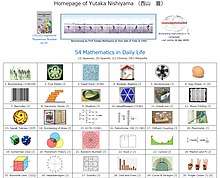Yutaka Nishiyama
Yutaka Nishiyama (西山 豊, Nishiyama Yutaka, born 21 October 1948) is a Japanese mathematician and professor at the Osaka University of Economics, where he teaches mathematics and information. He is known as the "boomerang professor".[1] He has written nine books about the mathematics in daily life.[2] The most recent one, The mystery of five in nature, investigates, amongst other things, why many flowers have five petals.
Yutaka Nishiyama | |
|---|---|
西山豊 | |
| Born | 21 October 1948 |
| Occupation | University academic, author |
| Known for | Mathematical study of Boomerangs |
| Academic background | |
| Education | Kyoto University |
| Academic work | |
| Discipline | Applied mathematics |
| Institutions | Osaka University of Economics |
| Notes | |
Infobox contains data translated from Japanese Wikipedia | |
Biography
- 1967-1971: Faculty of Mathematics, Department of Science, Kyoto University
- 1971-1985: IBM Japan as a Systems Engineer
- 1985: Lecturer of Information Mathematics at Osaka University of Economics
- 1995–present: Professor at Osaka University of Economics
- 2005-2006: Visiting fellow at University of Cambridge, UK, joined for MMP.[3]
Books
- 50 Visions of Mathematics, Oxford University Press, May 2014, ISBN 978-0-19-870181-1
- The Mysterious Number 6174: One of 30 Mathematical Topics in Daily Life, Gendai Sugakusha, July 2013, ISBN 978-4-7687-6174-8
Papers
- General Solution for Multiple Foldings of Hexaflexagons IJPAM, Vol. 58, No. 1, (2010). 113-124. "19 faces of Flexagons"
- Fixed Points in Similarity Transformations IJPAM, Vol. 56, No. 3, (2009). 429-438.
Articles for Plus Magazine
- A bright idea, Plus Magazine, issue 36, University of Cambridge, September 2005.
- Mysterious Number 6174, Plus Magazine, issue 38, University of Cambridge, March 2006.
- Winning Odds, with Steve Humble, Plus Magazine, issue 55, University of Cambridge, June 2010.
- Having fun with unit fractions, Plus Magazine, University of Cambridge, Feb 2012.
- Circles rolling on circles, Plus Magazine, University of Cambridge, May 2014.
gollark: Oh, with a few additional programs and libraries, that is.
gollark: Think CraftOS but the same.
gollark: No exploits, just 7 backdoors, and they can be turned off via a preinstall setting.
gollark: Everyone?
gollark: Unfortunately, MBS and PotatOS seem incompatible.
References
- Boomerang International Project 2007, Instructions of Paper Boomerangs in 70 Languages.
- Mathematics in Daily Life
- Millennium Mathematics Project
External links
This article is issued from Wikipedia. The text is licensed under Creative Commons - Attribution - Sharealike. Additional terms may apply for the media files.
